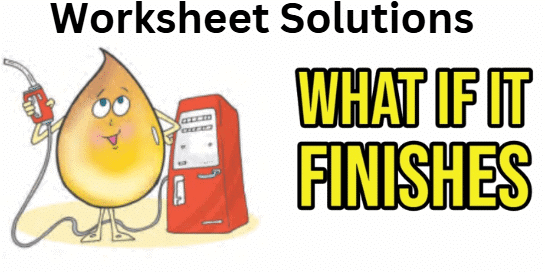What if it Finishes...? - 2 Class 5 Worksheet EVS Chapter 12

Q1: Fill in the Blanks
(i) We get L.P.G., wax, kerosene, petrol, coal tar and fuel for aircrafts from________.Ans: petroleum
(ii) Sound of the loud horns causes _______ pollution.
Ans: Noise
(iii) The smoke of the vehicles can cause _____.
Ans: Cough or Breathing Problems
(iv) To clean petroleum, it is sent to _______.
Ans: Refinery
(v) The poor villagers of our country still use _____ and ______ as fuel to cook food.
Ans: wood, uple or cow dung and dry twig
(vi) ______ is a smelly, thick, dark coloured liquid.
Ans: Petroluem
Q2: True and False
(i) We should use CNG over petrol.Ans: True
CNG (Compressed Natural Gas) is cleaner than petrol and diesel. It produces less smoke and pollution, making it a better fuel choice for the environment.
(ii) We should not pool car while going to some same place to save fuel.
Ans: False
Carpooling means sharing a ride with others going to the same place. This helps save fuel and reduces air pollution, so we should always try to carpool whenever possible.
(iii) Car is more fuel efficient than bus.
Ans: False
A bus can carry many people at the same time, while a car usually carries only a few. So, when we compare fuel usage per person, a bus is more fuel-efficient than a car.
(iv) The maximum use of cars, scooters etc. cause pollution.
Ans: True
Vehicles that use petrol or diesel release harmful smoke into the air, leading to air pollution. More vehicles mean more pollution, which affects our health and the environment.
(v) Petroleum should be used carefully to save fuel as well as environment.
Ans: True
Petroleum is a non-renewable resource, meaning it will finish if we use it too much. Using it wisely helps save fuel for the future and reduces pollution in the environment.
Q3: Short Answer Type Questions
(i) From where do we get petroleum?
Ans: We get petroleum from deep down under the ground.
(ii) How bus is more fuel efficient than car?
Ans: A bus can carry 40 to 50 passengers at a time where as car carries only.
(iii) Write full form of LPG and CNG.
Ans: Full form of
- LPG is liquid petroleum gas.
- CNG is compressed petroleum gas.
(iv) How is petroleum formed?
Ans: It is formed naturally but very slowly. It takes thousands years to form.
 |
Download the notes
Worksheet Solutions: What if it Finishes ...? - 2
|
Download as PDF |
Q4: Long Answer Type Questions
(i) How can we save petrol?
Ans: We can save petrol by following ways:-
- We should go to nearby areas on foot.
- We should pool our car if we are going to some same place.
- We should go by bus from one place to another.
- We should switch off the engine of our vehicle at red light.
- We should use CNG in our cars instead of petrol or diesel.
(ii) How do we pump out petroleum from the deep?
Ans: We can pump out petroleum like we pump out water by using bore well. We need big machines and pipes to pump it out and clean it.
(iii) How many villagers in India use dry twig, wood and cow dung? And why?
Ans: Nearly 2/3 people in our country use these things. They use these things for cooking food, keeping warm, heating water and for lightening.
(iv) Write some uses of petroleum?
Ans: It is used to run vehicles.
- It is used to generate (make) electricity.
- It is used to cook food.
- It is used to run machines.
- It is used to run aircrafts and ships.
- It is used to make paints.
(v) Why is there need to clean petroleum?
Ans: This oil is smelly, thick and dark coloured liquid. It has kerosene oil, wax, diesel, engine oil, grease and coal tar and petrol. That is why petroleum needs to be cleaned and all the things are to be separated.
(vi) Why should we use LPG in kitchen and CNG in vehicles?
Ans: Both LPG and CNG are smoke free gas. They do not spread pollution. So we should use these gases in our kitchen and vehicles respectively.
(vii) What kind of problems do we face because of the increasing number of vehicles on the roads?
Ans: The increasing number of vehicles causes traffic jam.
- It also causes noise and air pollution.
- It also causes breathing problem.
- It causes cough.
- It also results in global warming.
|
38 videos|242 docs|41 tests
|
FAQs on What if it Finishes...? - 2 Class 5 Worksheet EVS Chapter 12
| 1. What are some possible consequences if a worksheet finishes in a class? |  |
| 2. How can teachers handle the situation if a worksheet finishes early in a class? |  |
| 3. What can teachers do to prevent worksheets from finishing early in a class? |  |
| 4. How can students benefit if a worksheet finishes early in a class? |  |
| 5. Are there any disadvantages if a worksheet finishes early in a class? |  |
































